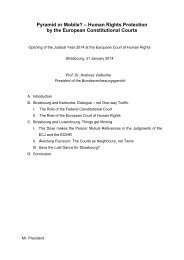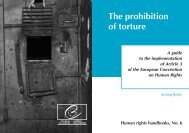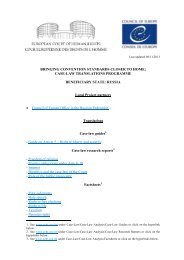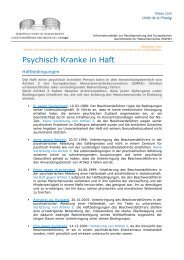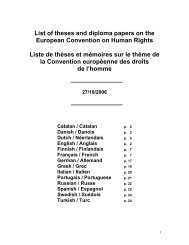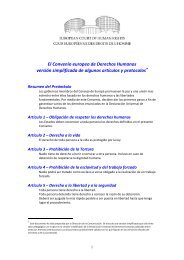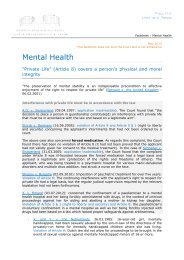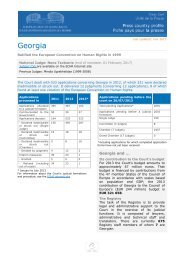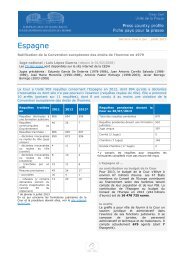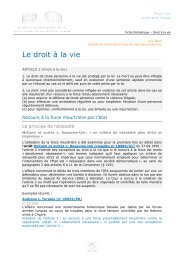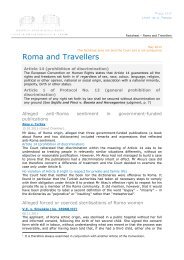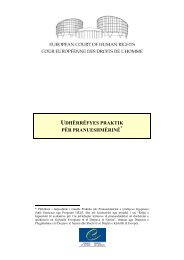Factsheet Interim measures - European Court of Human Rights ...
Factsheet Interim measures - European Court of Human Rights ...
Factsheet Interim measures - European Court of Human Rights ...
You also want an ePaper? Increase the reach of your titles
YUMPU automatically turns print PDFs into web optimized ePapers that Google loves.
<strong>Factsheet</strong> - <strong>Interim</strong> <strong>measures</strong><br />
circumstances where the fugitive has suffered or risks suffering a flagrant denial <strong>of</strong> a fair<br />
trial in the requesting country. However, the facts <strong>of</strong> the present case do not disclose<br />
such a risk.”<br />
Othman (Abu Qatada) v. the United Kingdom (no. 8139/09)<br />
17.01.2012<br />
A Jordanian national, suspected <strong>of</strong> having links with al-Qaeda and tried in absentia in his<br />
country, Mr Othman arrived in the United Kingdom in September 1993 where he made a<br />
successful application for asylum. He was detained in October 2002 under the Anti-<br />
Terrorism, Crime and Security Act. In March 2005 he was released on bail and made<br />
subject to a control order under the Prevention <strong>of</strong> Terrorism Act. He was served in<br />
August 2005 with a notice <strong>of</strong> intention to deport him to Jordan. Before the <strong>Court</strong>, the<br />
applicant alleged in particular that he faced a real risk <strong>of</strong> suffering a flagrant denial <strong>of</strong><br />
justice in the event <strong>of</strong> his deportation, on account <strong>of</strong> the possible use in his new trial <strong>of</strong><br />
evidence obtained by torture. The <strong>Court</strong> indicated an interim measure to prevent his<br />
expulsion until it had examined his application.<br />
In its judgment on the merits, the <strong>Court</strong> for the first time reached the conclusion that an<br />
expulsion would entail a violation <strong>of</strong> Article 6. That finding reflected the international<br />
consensus that the admission <strong>of</strong> evidence obtained by torture was incompatible with the<br />
right to a fair trial.<br />
Risk for the applicant’s health<br />
Rule 39 has also been applied where the risk to the applicant’s life and well-being<br />
stemmed from the expulsion/extradition measure itself or its effects.<br />
Einhorn v. France (no. 71555/01)<br />
19.07.2001<br />
Having been informed that the applicant had attempted to commit suicide, the <strong>Court</strong><br />
requested the French Government to give it information on his state <strong>of</strong> health, and not<br />
to extradite him pending a new decision. The interim measure was lifted a week later<br />
after the French Government had provided a medical report confirming that Mr Einhorn<br />
could be transferred by plane to the USA under medical and police supervision.<br />
D. v. the United Kingdom (no. 30240/96)<br />
02.05.1997<br />
The <strong>Court</strong> applied Rule 39 to request the British Government not to deport the applicant,<br />
who was HIV-positive and at an advanced stage <strong>of</strong> illness, because he would not have<br />
been able to receive medical treatment if he had been sent to his destination country.<br />
The <strong>Court</strong> took account <strong>of</strong> the “very exceptional circumstances” and “compelling<br />
humanitarian considerations”. The applicant was critically ill and appeared to be close to<br />
death, could not be guaranteed any nursing or medical care in his country <strong>of</strong> origin and<br />
had no family there willing or able to care for him or provide him with even a basic level<br />
<strong>of</strong> food, shelter or social support.<br />
N. v. the United Kingdom (no. 26565/05)<br />
27.05.2008 (Grand Chamber)<br />
Rule 39 was applied in this case for an applicant who was also HIV-positive but whose<br />
condition was not as serious as in the D. v. the United Kingdom case cited above.<br />
It appears that Rule 39 will no longer be applied in cases concerning the expulsion <strong>of</strong><br />
applicants with medical problems unless “exceptional circumstances” are at stake.<br />
Particular situation <strong>of</strong> expulsion to another State party to the Convention<br />
Even though there is a certain presumption that Contracting States will provide the<br />
necessary guarantees to ensure that an applicant is not subjected to ill-treatment and<br />
that he or she will continue to enjoy the Convention rights after being sent to such a<br />
5



